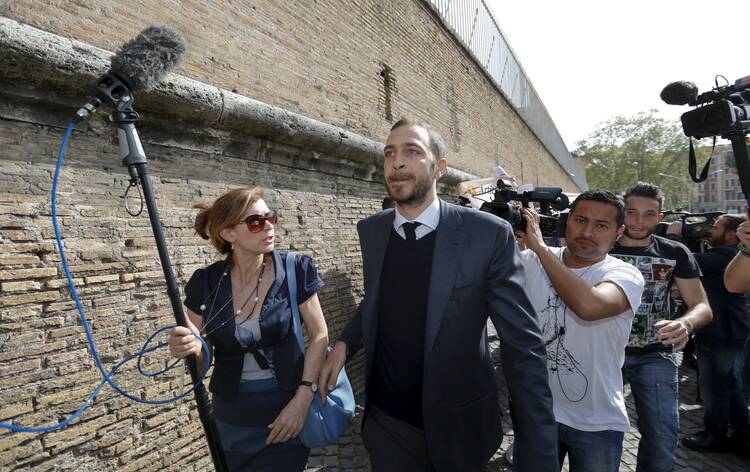Two Vatican Promoters of Justice (or prosecutors) asked for prison sentences on July 4 for a Spanish monsignor, an Italian public relations professional and an Italian layman who were all involved in leaking confidential information regarding Vatican finances. Those documents had been considered protected by law in the Vatican City State.
The promoters also asked for a prison sentence for one of the two journalists who wrote books based on this leaked information.
The law of the Vatican City State, revised by Pope Francis in 2013, considers the revealing of information and documents regarding the fundamental interests of the state as a criminal offence (Articles 248 and 116-bis of the penal code). After a trial that started last November, based on this law, the prosecutors—Professors Giampiero Milano and Roberto Zannotti—called for prison sentences for the three people that were employed by the Vatican at the time of the crime. All three had access to the confidential information that was produced by a finance commission set up by Pope Francis in July 2013 as part of his reform project. The Vatican employees had been charged with “the crime of criminal association.”
After a long investigation and court discussion, the prosecutors demanded a sentence of three years and one month in prison for the Spanish monsignor, Angel Lucio Vallejo Balda, who was secretary of the reform commission. He has already spent several months in prison to prevent him from interfering with evidence. They also asked for a prison sentence of three years and nine months for Dr. Francesca Immacolata Chaouqui, whom they charged with being “the inspirer and person responsible” for leaking the information.
Chaouqui had avoided imprisonment last November because she was pregnant, and today she was in court with her new-born baby in her arms. The prosecutors further demanded a sentence of one year and nine months for Dr. Nicola Maio, a layman working in the Vatican office that handled this information. Prosecutors considered Maio to have had a limited role in this criminal activity.
Vatican prosecutors distinguished between the two journalists that had been accused of divluging of information through their respective books. Gianluigi Nuzzi is the author of Via Crucis (released in English as Merchants in the Temple) and Emiliano Fittipaldi is author of Avarice.
They asked that the court absolve Fittipaldi “for lack of evidence,” but they demanded that Nuzzi be condemned to a suspended sentence of one year in prison.
The defendants’ lawyers will address the court on July 5 and 6. Sometime after that the Vatican judges will reach their verdict. At the end of the trial, however, it is expected that in this Jubilee Year of Mercy, which he has declared, Pope Francis will pardon all those convicted of these crimes.








